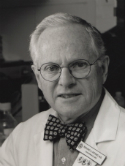Suberoylanilide hydroxamic acid (vorinostat) represses androgen receptor expression and acts synergistically with an androgen receptor antagonist to inhibit prostate cancer cell proliferation Journal Article
| Authors: | Marrocco, D. L.; Tilley, W. D.; Bianco-Miotto, T.; Evdokiou, A.; Scher, H. I.; Rifkind, R. A.; Marks, P. A.; Richon, V. M.; Butler, L. M. |
| Article Title: | Suberoylanilide hydroxamic acid (vorinostat) represses androgen receptor expression and acts synergistically with an androgen receptor antagonist to inhibit prostate cancer cell proliferation |
| Abstract: | Growth of prostate cancer cells is initially dependent on androgens, and androgen ablation therapy is used to control tumor growth. Unfortunately, resistance to androgen ablation therapy inevitably occurs, and there is an urgent need for better treatments for advanced prostate cancer. Histone deacetylase inhibitors, such as suberoylanilide hydroxamic acid (SAHA; vorinostat), are promising agents for the treatment of a range of malignancies, including prostate cancer. SAHA inhibited growth of the androgen-responsive LNCaP prostate cancer cell line at low micromolar concentrations and induced caspase-dependent apoptosis associated with chromatin condensation, DNA fragmentation, and mitochondrial membrane depolarization at higher concentrations (≥5 μmol/L). Gene profiling and immunoblot analyses showed a decrease in androgen receptor (AR) mRNA and protein in LNCaP cells cultured with SAHA compared with control cells, with a corresponding decrease in levels of the AR-regulated gene, prostate-specific antigen. Culture of LNCaP cells in steroid-free medium markedly sensitized the cells to SAHA. Moreover, a combination of low, subeffective doses of SAHA and the AR antagonist bicalutamide resulted in a synergistic reduction in cell proliferation and increase in caspase-dependent cell death. Addition of exogenous androgen prevented the induction of cell death, indicating that suppression of androgen signaling was required for synergy. At the subeffective concentrations, these agents had no effect, alone or in combination, on proliferation or death of AR-negative PC-3 prostate cancer cells. Our findings indicate that SAHA is effective in targeting the AR signaling axis and that androgen deprivation sensitizes prostate cancer cells to SAHA. Consequently, combinatorial treatments that target different components of the AR pathway may afford a more effective strategy to control the growth of prostate cancer cells. Copyright © 2007 American Association for Cancer Research. |
| Keywords: | signal transduction; controlled study; protein expression; human cell; placebo; cell proliferation; prostate specific antigen; cell death; cell viability; cell survival; cell cycle; apoptosis; gene expression profiling; neoplasm proteins; tumor cells, cultured; caspase; prostate cancer; drug synergism; prostatic neoplasms; gene expression regulation; cancer inhibition; gene expression regulation, neoplastic; messenger rna; rna, messenger; anticarcinogenic agents; immunoblotting; vorinostat; hydroxamic acids; cell cycle arrest; androgen receptor; bicalutamide; receptors, androgen; mitochondrial membrane; drug sensitivity; anilides; concentration response; culture media; cell strain lncap; growth inhibition; steroids; chromatin condensation; membrane depolarization |
| Journal Title: | Molecular Cancer Therapeutics |
| Volume: | 6 |
| Issue: | 1 |
| ISSN: | 1535-7163 |
| Publisher: | American Association for Cancer Research |
| Date Published: | 2007-01-01 |
| Start Page: | 51 |
| End Page: | 60 |
| Language: | English |
| DOI: | 10.1158/1535-7163.mct-06-0144 |
| PUBMED: | 17218635 |
| PROVIDER: | scopus |
| DOI/URL: | |
| Notes: | --- - "Cited By (since 1996): 38" - "Export Date: 17 November 2011" - "CODEN: MCTOC" - "Source: Scopus" |
Altmetric
Citation Impact
BMJ Impact Analytics
Related MSK Work





